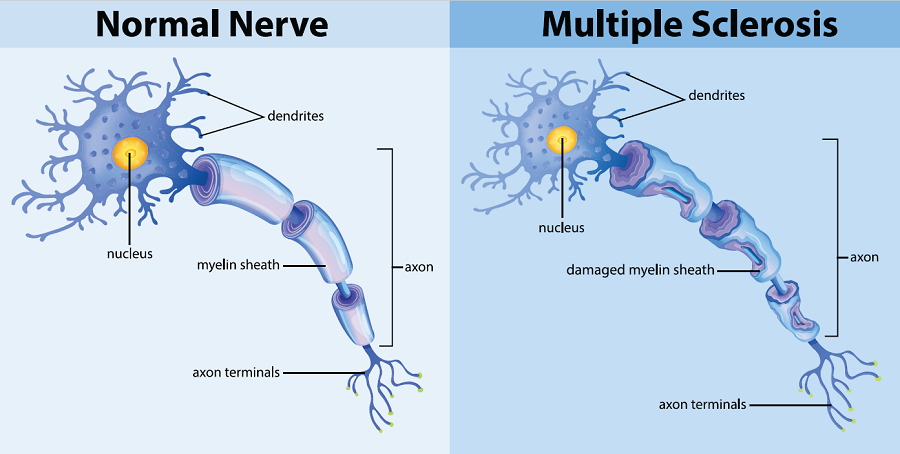Immune-Mediated Disease
Our immune systems are responsible for protecting our bodies from infection. An immune-mediated disease results from an abnormal immune system response. In these diseases, the immune system mistakenly targets the body and creates an inflammatory response that causes damage.In multiple sclerosis, something triggers the immune system to attack the central nervous system (the brain, spinal cord and optic nerves). The resulting inflammatory response damages certain structures and cells, including:
- Myelin (the fatty sheath that surrounds and protects nerve fibers)
- Oligodendrocytes (special cells that produce myelin in the central nervous system)
- Nerve fibers underlying myelin
Immune-Mediated Disease vs. Autoimmune Disease
Scientists believe that one or more environmental factors trigger MS in a genetically susceptible individual. These environmental factors include an unknown foreign substance, called an antigen, such as a virus or toxin. In autoimmune diseases, researchers have identified the specific antigen that is responsible. But researchers have not yet identified specific antigens that trigger MS. Despite this, most experts believe MS is an autoimmune disease.T Cells and B Cells in MS
Many different cells are involved in the abnormal immune response seen in MS. Two important types of immune cells are T cells and B cells.- T cells become activated in the lymph system and, in MS, enter the central nervous system through blood vessels. Once there, T cells release chemicals that cause inflammation. This results in damage to myelin, nerve fibers and the cells that make myelin. T cells also help activate B cells and call on other immune system cells to participate in the immune attack.
- T regulatory cells, a type of T cell, dampen or turn off inflammation. In MS, T regulatory cells do not function correctly and do not effectively turn off inflammation.
- Cytotoxic or “killer” T cells directly attack and destroy cells with certain characteristics.
- B cells become activated with the help of T cells. B cells in MS can cause damage in the central nervous system through the production of antibodies and by stimulating other proteins.
Abnormal Immune Response and Multiple Sclerosis
The abnormal immune system attack produces inflammation and:- Damages or destroys myelin and oligodendrocytes (a process referred to as demyelination)
- Causes damage to the axons
- Produces lesions or scars along the nerve, which can be detected on MRI
- Slows or halts nerve conduction — producing the neurologic signs and symptoms of MS

Learn more about what causes MS.
Myelin and Multiple Sclerosis
Myelin is a fatty substance that surrounds and insulates axons (or nerve fibers) much like insulation on an electrical wire. It is an electrical conductor composed mostly of fats, water and proteins.Myelin is present throughout your nervous system. However, only the central nervous system is affected by multiple sclerosis. Special cells called oligodendrocytes produce myelin in the CNS.This coating of myelin around axons is often referred to as a myelin sheath. The myelin sheath protects the axons and helps speed nerve transmissions. If the myelin sheath is damaged, these nerve signals will travel more slowly or be blocked completely.Demyelination and Demyelinating Disease
In MS, the immune system primarily attacks the myelin sheath that surrounds the nerve fibers, also known as axons. This makes it harder for the CNS to replace the damaged myelin. All of this leads to a loss of myelin, or demyelination. Without the myelin insulation, the axons, or nerve fibers, also get damaged. They can even be completely severed.A disease that causes this process is called a demyelinating disease.Effects of Axon Damage
When the axon is damaged or severed, messages no longer travel efficiently between the brain and the body. This causes the symptoms of MS, including vision problems, walking or gait difficulties and cognitive changes.Myelin has some ability to repair itself, and researchers are looking for ways to restore what has been lost in people with MS. However, axons cannot be repaired and damage to axons can occur even in the earliest stages of the disease. That’s why early treatment with a disease-modifying therapy (DMT) should be considered by anyone with a confirmed diagnosis of MS.Demyelinating lesions are damaged areas in the brain and spinal cord caused by the immune-system attack. The exact type and severity of your symptoms depends on the number of lesions and the area of the central nervous system that’s damaged.Therapies for MS Directed Against the Immune-Mediated Response
The DMTs for MS work by various mechanisms, with different therapies having different mechanisms of action. These mechanisms include:- Interfering with the activation of T cells
- Reducing the inflammation and immune activity
- Blocking the movement of immune system cells
- Depleting the numbers of immune system cells
- Limiting entry of immune cells into the CNS